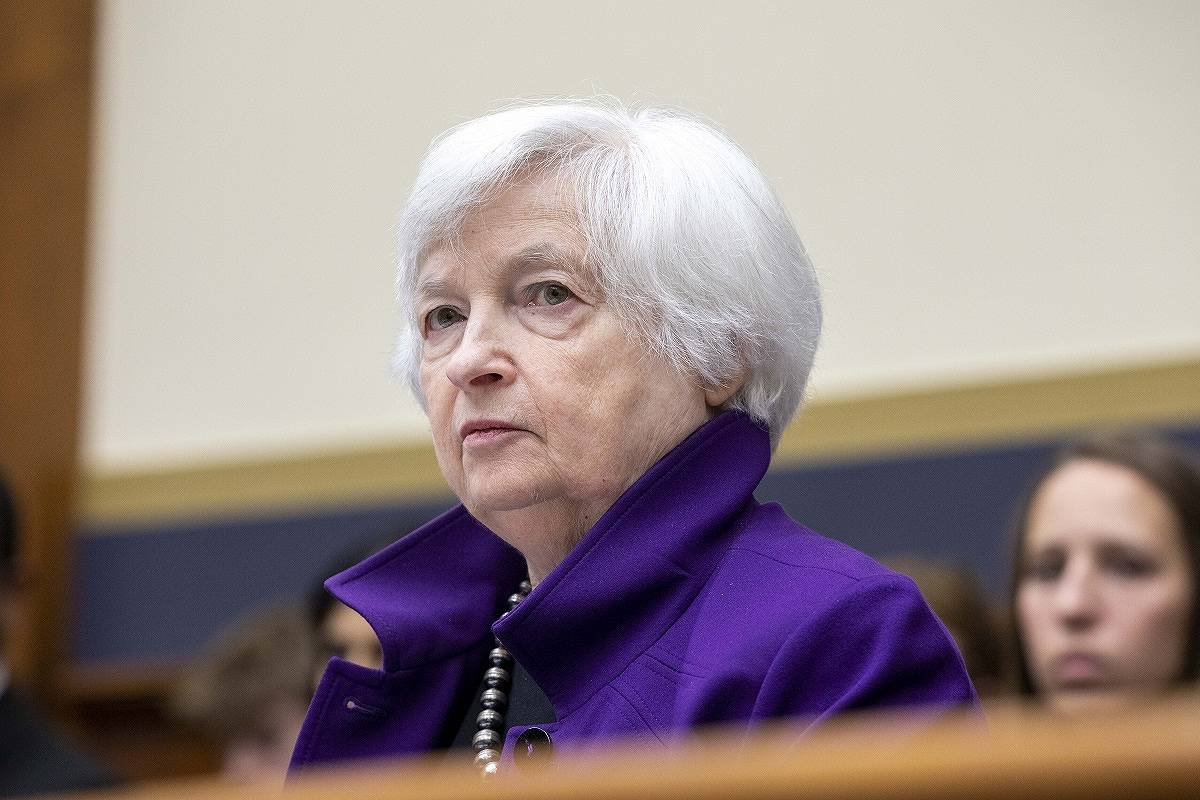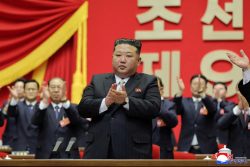US Treasury Secretary Janet Yellen Visits China as Part of Efforts to Soothe Strained Relations

Treasury Secretary Janet Yellen testifies before the House Financial Services Committee during a hearing regarding the state of the international financial system at the Capitol in Washington, Tuesday, June 13, 2023.
11:10 JST, July 7, 2023
BEIJING (AP) — Treasury Secretary Janet Yellen plans to tell Chinese officials that Washington wants healthy economic competition but will defend trade curbs imposed by the U.S. on security grounds and express concern about Beijing’s export controls on metals used in semiconductors and solar panels, a senior Treasury official said Thursday.
Yellen was due to meet Friday with China’s No. 2 leader, Premier Li Qiang, as part of efforts to revive relations that are at their lowest level in decades due to disputes over security, technology and other irritants. Treasury officials have said she wouldn’t meet with Chinese leader Xi Jinping.
Washington doesn’t support decoupling, or disconnecting U.S. and Chinese industries and markets, and Yellen will reiterate that message, the Treasury official said. Businesspeople have warned that might harm innovation and growth as both governments tighten controls on trade in technology and other goods deemed sensitive.
Yellen planned to discuss “targeted action” by Washington on trade due to national security or human rights concerns, according to the official, who briefed reporters on condition of anonymity.
Her visit follows one by Secretary of State Antony Blinken, who met Xi last month in the highest-level U.S. visit to Beijing in five years. The two agreed to stabilize relations but failed to agree on improving communications between their militaries.
Major agreements aren’t expected to come out of the meetings between Yellen and Chinese officials this week, says William Reinsch, a senior advisor at the Center for Strategic & International Studies in Washington.
Rather the hope of restarting dialogue between the two nations is the goal. “The best you can hope for this time around would be if the Chinese agree to some kind of structure for continuing economic conversations,” he said.
China’s government has been frustrated by U.S. curbs on Chinese access to advanced processor chips on security grounds. That threatens to delay or derail the ruling Communist Party’s efforts to develop telecoms, artificial intelligence and other technologies.
Xi accused Washington in March of trying to hamper China’s development.
Washington doesn’t use security-related restrictions for economic benefit and considers national security “non-negotiable,” the Treasury official said.
The United States wants “healthy economic competition” with China but considers some of Beijing’s trade practices unfair, the official said. They said Yellen would detail those concerns in meetings with Chinese officials.
The official cited this week’s announcement of Chinese export controls on gallium and germanium as an example of policies about which Washington wants more information. The announcement jolted South Korea and other countries whose industries use Chinese supplies of the metals.
Washington wants to “promote resilient supply chains” and guard against excessive reliance on suppliers in critical areas but doesn’t consider that to be decoupling, the Treasury official said.
Sourabh Gupta, a senior Asia-Pacific international relations policy specialist at the Institute for China-America Studies in Washington, said the U.S. argument that targeted restrictions are coming from a national security standpoint and not an economic competitiveness one isn’t expected to convince the Chinese government but may provide further assurances that more communication between the countries is desired.
“It does help create a certain reassurance that at least the U.S. is looking for a good relationship,” he said.
Yellen said earlier the two governments “can and need to find a way to live together” in spite of their strained relations over geopolitics and economic development.
Treasury officials told reporters earlier in Washington the secretary wanted to focus on stabilizing the global economy and challenging Chinese support of Russia during its invasion of Ukraine.
The latest flareup came after President Joe Biden referred to Xi as a dictator. The Chinese government protested, but Biden said his blunt statements are “just not something I’m going to change very much.”
Ties became especially testy after a Chinese surveillance balloon flew over the United States in February and was subsequently shot down.
Biden’s climate envoy, John Kerry, is slated to become the next administration official to visit China, next week, a State Department official confirmed Thursday.
China and the U.S. are the world’s No. 1 and No. 2 top climate polluters, giving their one-on-one climate talks outsize importance.
The trip will be Kerry’s first to China since it broke off climate discussions with the U.S. in August in retaliation for then-House Speaker Nancy Pelosi’s travel to Taiwan. Kerry, a former Secretary of State, is pushing China to move faster to wean itself off of dirty-burning coal-fired power plants and commit itself to a plan to reduce leaks of destructive methane from natural gas.
Top Articles in News Services
-

Survey Shows False Election Info Perceived as True
-

Prudential Life Expected to Face Inspection over Fraud
-

Hong Kong Ex-Publisher Jimmy Lai’s Sentence Raises International Outcry as China Defends It
-

Japan’s Nikkei Stock Average Touches 58,000 as Yen, Jgbs Rally on Election Fallout (UPDATE 1)
-

Japan’s Nikkei Stock Average Falls as US-Iran Tensions Unsettle Investors (UPDATE 1)
JN ACCESS RANKING
-

Japan PM Takaichi’s Cabinet Resigns en Masse
-

Japan Institute to Use Domestic Commercial Optical Lattice Clock to Set Japan Standard Time
-

Israeli Ambassador to Japan Speaks about Japan’s Role in the Reconstruction of Gaza
-

Man Infected with Measles Reportedly Dined at Restaurant in Tokyo Station
-

Videos Plagiarized, Reposted with False Subtitles Claiming ‘Ryukyu Belongs to China’; Anti-China False Information Also Posted in Japan























